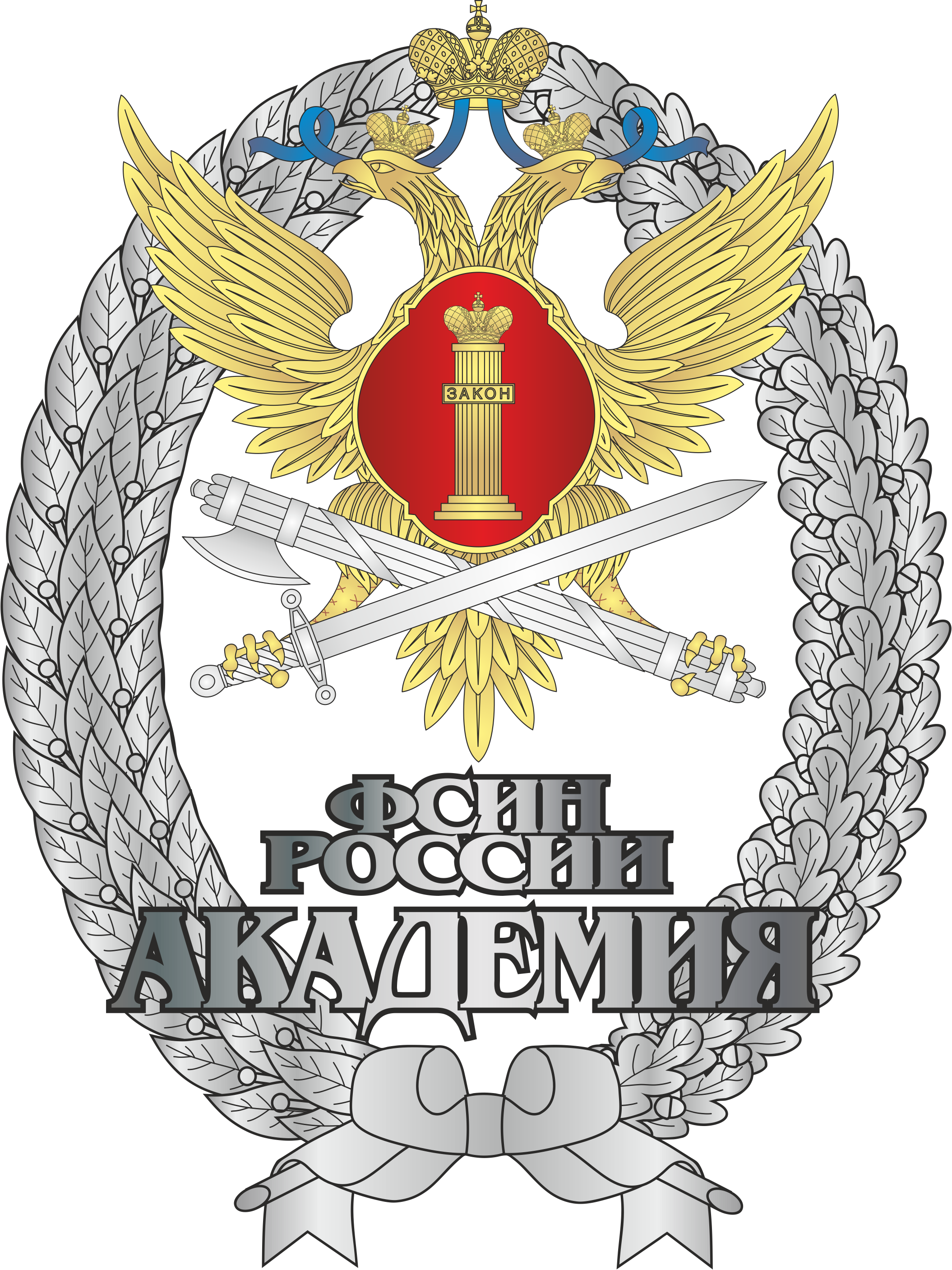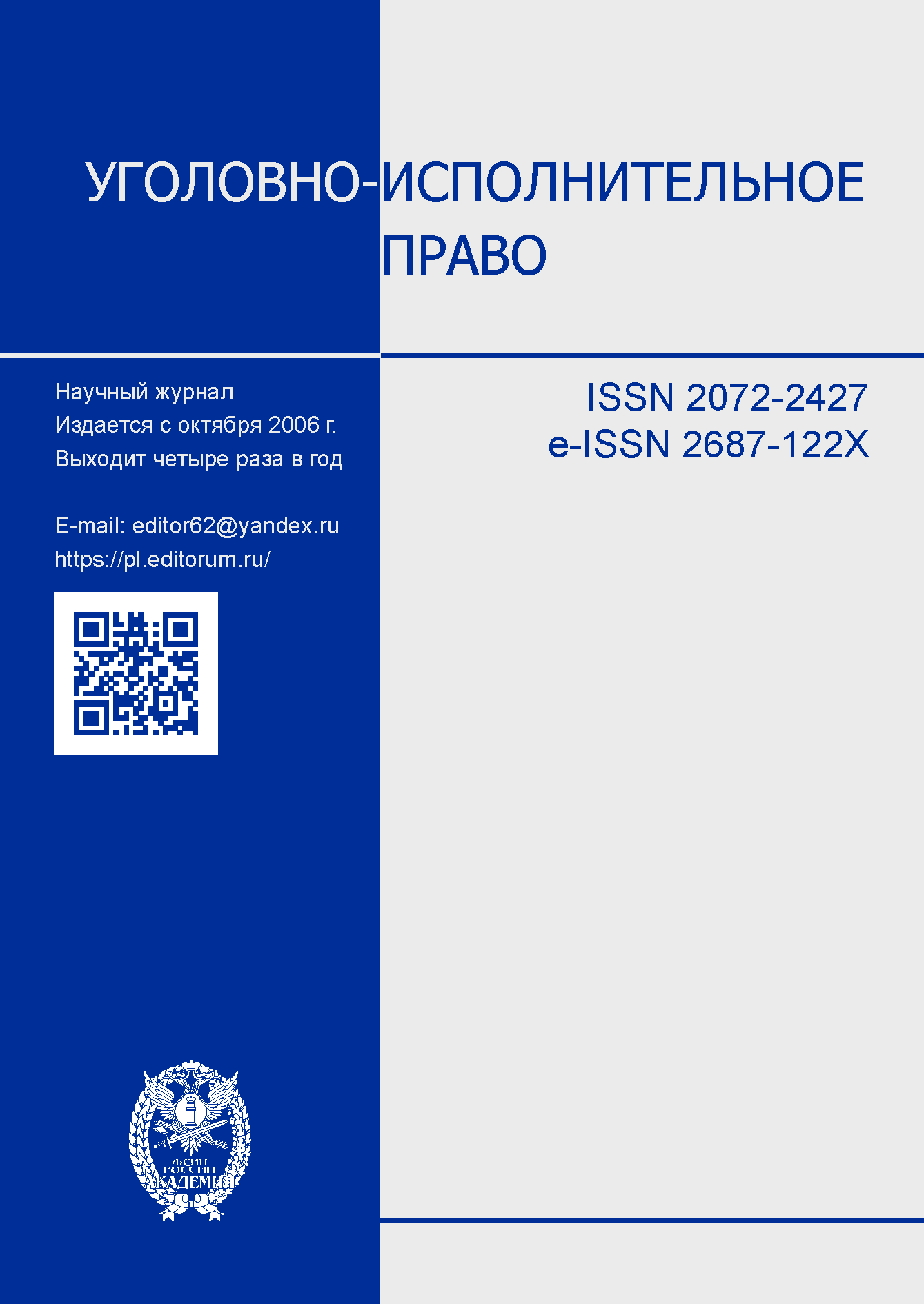UDC 34
The author substantiates the complex nature of the content of criminal punish- ment, which provides for the regulation not only of criminal law, but also of penal legislation, as well as other normative legal acts, contradicting to part 1 of article 3 of the Criminal code of the Russian Federation. It is concluded that the elements forming the content of punishment should be reflected only in the substantive law, or in the Criminal code of the Russian Federation.Some punitive elements of criminal punishment in the form of corrective labor are consid- ered. One of them is the fact that a convict must serve this type of punishment at strictly defined facilities (or in a strictly defined place), that is, a convict is deprived of the right to choose the place of work. Proceeding from part 1 of article 50 of the Criminal code of the Russian Feder- ation the punishment in corrective works is revealed in the following that a person sentenced to corrective works has to carry out strictly certain type of works. Determination of corrective works, their type and nature, as well as the kind of activity and job shall be only in competence of court, otherwise local governments and penal inspection will be able not only to decrease, but also to expand the punitive maintenance of corrective works. In addition, the severity of cor- rectional labor should be determined according to certain case, taking into account the physi- cal and psychological characteristics of a convict. It is necessary not only to assess the nature of the work performed by the convict at the place of previous job, but also to take into account that the nature of the work does not affect the ability of the convict negatively.This provision should be fixed in criminal law, both for juvenile and for adult convicts. Convicted to corrective works has the right to monthly obligatory social insurance payments from accidents and dis- eases, also the right to rest and leisure regulated by part 5 of article 37 of the Constitution of the Russian Federation. The author notes that when serving a criminal sentence in the form of correctional labor, the convict is deprived and limited not only in his rights and legitimate in- terests, but also in his duties. For example, a person sentenced to corrective works loses the obligation to fulfill the constitutional duty for protection of the motherland according to military induction (part 1 of article 59 of the Constitution of the Russian Federation). Punishment in the form of correctional labor deprives and restricts a person in the performance of his duties, that is, the punishment reduces the amount of mandatory actions imposed on a person. This legal restriction is not specified in the Criminal code of the Russian Federation, and in the Pe- nal code of the Russian Federation. This gap should then be eliminated. It is concluded that aconvicted person setenced to correctional labor may experience a number of other procedural legal restrictions not specified in the Criminal code of the Russian Federation and not related to the content of the considered type of punishment, but arising from the essence and caused by the regime of this punishment, as well as regulated by separate procedural provisions of the penal enforcement legislation.For improvement of the application processes (appointment and execution) and serving of punishment in the form of corrective works the new edition of article 50 of the Criminal code of the Russian Federation is offered. The author defines the status of penal law as a procedural branch of law renaming it in the penal process (procedural law) which should not be included in the scientific specialty 12.00.08. Thus, taking into account the procedural nature of social relations regulated by the penal law, the penal law itself is essentially a criminal procedural law. At the same time, the author does not exclude the existence of his procedural material norms in the criminal procedural law.
corrective labor, contents of criminal punishment in thr form of correctional labor, punishment, condemned, material law, criminal law, procedural law, penal law, уголовно-pe- nal procedural law
1. Orlov V. N. Nakazanie: ugolovno-pravovoy i ugolovno-ispolnitel'nyy analiz : monografiya. M., 2014. 624 s
2. Orlov V. N. Ugolovnye nakazaniya, ne svyazannye s izolyaciey osuzhdennogo ot obschestva // Ugolovnoe pravo. 2006. № 6. S. 52-56
3. Kurochka E. V. Problemy nakazaniya v ugolovnom prave Rossii : dis. … kand. yurid. nauk. Saratov, 2000. 158 s
4. Kurochka E. V. Nakazanie v Rossii kak gosudarstvennaya mera pravoogranicheniya lichnosti // Sledovatel'. 2002. № 5. S. 15-17
5. Seliverstov V. I. Nakazanie i ego celi // Ugolovnoe pravo. Obschaya chast': uchebnik / pod obsch. red. V. I. Radchenko. M., 2004. 722 s
6. Antonyan E. A. Nekotorye sovremennye teorii v penitenciarnoy nauke // Probely v rossiyskom zakonodatel'stve. 2008. № 1. S. 304-306
7. Natashev A. E. Soderzhanie nakazaniya i rezhim ego otbyvaniya // Trudy Vsesoyuznogo nauchno-issledovatel'skogo instituta MVD SSSR. M., 1974. № 30. S. 11-12
8. Gus'kov V. I. Naznachenie i ispolnenie ispravitel'nyh rabot kak mery ugolovnogo nakazaniya : dis. … kand. yurid. nauk. M., 1966. 304 s
9. Krahmal'nik L. G. Povysit' effektivnost' ispravitel'nyh rabot // Prokurorskiy nadzor za soblyudeniem zakonnosti v mestah lisheniya svobody i ispolneniem prigo- vorov o ssylke i ispravitel'nyh rabot bez lisheniya svobody. M., 1965
10. Ozhegov S. I., Shvedova N. Yu. Tolkovyy slovar' russkogo yazyka. 4-e izd., dop. M., 1999. 944 s
11. Bazunov A. P. Voprosy teorii i praktiki ispravitel'nyh rabot bez lisheniya svobody v sovetskom prave : dis. … kand. yurid. nauk. Saratov, 1966. 307 s
12. Kollizii zakonodatel'stva Rossii (kratkiy nauchnyy kommentariy) : monografiya / A. P. Skiba [i dr.] ; pod red. A. A. Krymova. 2-e izd., ispr. i dop. Ryazan', 2016. 207 s
13. Skiba A. P. K voprosu o razgranichenii ugolovno-pravovogo, ugolovno-ispolnitel'nogo i ugolovno-processual'nogo regulirovaniya // Vestnik universiteta imeni O. E. Kutafina. 2017. № 7. S. 69-76
14. Struchkov N. A. Ispravitel'no-trudovoe ili ugolovno-ispolnitel'noe pravo // Sovetskoe gosudarstvo i pravo. 1979. № 1. S. 68-75
15. Orlov V. N. Osnovy ugolovno-ispolnitel'nogo prava (processa). Obschaya i Oso- bennaya chasti : uchebnik. M., 2017. 496 s
16. Orlov V. N. Koncepcii professora N. A. Struchkova i perspektivy razvitiya ugolovno- ispolnitel'nogo prava // Vestnik universiteta imeni O. E. Kutafina. 2017. № 7. S. 62-68
17. Orlov V. N. Ugolovno-ispolnitel'nyy processual'nyy kodeks RF: koncepciya, osnovnye polozheniya // Ugolovnoe sudoproizvodstvo. 2017. № 3. S. 6-10
18. Orlov V. N. Ugolovno-ispolnitel'nyy processual'nyy kodeks: osnovnye idei // Ugolovno-ispolnitel'noe pravo. 2017. T. 12(1-4), № 2. S. 153-157











